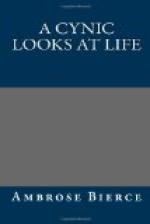I do not hold that the political and social system that creates an aristocracy of leisure is the best possible kind of human organization; I perceive its disadvantages clearly enough. But I do hold that a system under which most important public trusts, political and professional, civil and military ecclesiastical and secular, are held by educated men—that is, men of trained faculties and disciplined judgment—is not an altogether faulty system.
It is a universal human weakness to disparage the knowledge that we do not ourselves possess, but it is only my own beloved country that can justly boast herself the last refuge and asylum of the impotents and incapables who deny the advantage of all knowledge whatsoever. It was an American senator who declared that he had devoted a couple of weeks to the study of finance, and found the accepted authorities all wrong. It was another American senator who, confronted with certain hostile facts in the history of another country, proposed “to brush away all facts, and argue the question on consideration of plain common sense.”
Republican institutions have this disadvantage: by incessant changes in the personnel of government—to say nothing of the manner of men that ignorant constituencies elect; and all constituencies are ignorant—we attain to no fixed principles and standards. There is no such thing here as a science of politics, because it is not to any one’s interest to make politics the study of his life. Nothing is settled; no truth finds general acceptance. What we do one year we undo the next, and do over again the year following. Our energy is wasted in, and our prosperity suffers from, experiments endlessly repeated.
Every patriot believes his country better than any other country. Now, they cannot all be the best; indeed, only one can be the best, and it follows that the patriots of all the others have suffered themselves to be misled by a mere sentiment into blind unreason. In its active manifestation—it is fond of killing—patriotism would be well if it were simply defensive; but it is also aggressive, and the same feeling that prompts us to strike for our altars and our fires impels us over the border to quench the fires and overturn the altars of our neighbors. It is all very pretty and spirited, what the poets tell us about Thermopylae, but there was as much patriotism at one end of that pass as there was at the other.
Patriotism deliberately and with folly aforethought subordinates the interests of a whole to the interests of a part. Worse still, the fraction so favored is determined by an accident of birth or residence. The Western hoodlum who cuts the tail from a Chinaman’s nowl, and would cut the nowl from the body, if he dared, is simply a patriot with a logical mind, having the courage of his opinions. Patriotism is fierce as a fever, pitiless as the grave and blind as a stone.




